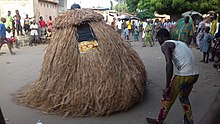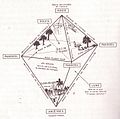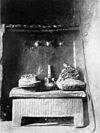Introduction The beliefs and practices of African people are highly diverse, including various ethnic religions. Generally, these traditions are oral rather than scriptural and are passed down from one generation to another through folk tales, songs, and festivals, and include beliefs in spirits and higher and lower gods, sometimes including a supreme being, as well as the veneration of the dead, and use of magic and traditional African medicine. Most religions can be described as animistic with various polytheistic and pantheistic aspects. The role of humanity is generally seen as one of harmonizing nature with the supernatural. In the past, African religion used to be referred to as 'traditional' but this is no longer appropriate. 'Traditional' was used to distinguish Africa religion from Abrahamic religion which came to the continent as a result of proselytism. Colonialism supported the false view that Africa had no religion. ( Full article...) Selected articleThe Mbuti mythology (or Bambuti mythology) is the mythology of the African Mbuti (also known as Bambuti) Pygmies of Congo. The most important god of the Bambuti pantheon is Khonvoum (also Khonuum, Kmvoum, Chorum), a god of the hunt who wields a bow made from two snakes that together appear to humans as a rainbow. Selected imagesFestivalsThere are several religious festivals found in the various Traditional African religions. Some of these are listed below next to their corresponding religion :
Selected biography
Akhenaten (
/ˌækəˈnɑːtən/; also spelled Echnaton, and Khuenaten; meaning "Effective for Aten"), known before the fifth year of his reign as Amenhotep IV), was an
ancient Egyptian
pharaoh of the
18th Dynasty who ruled for 17 years and died perhaps in 1336 BC or 1334 BC. He is noted for abandoning traditional Egyptian
polytheism and introducing worship centered on the
Aten, which is sometimes described as
monolatristic,
henotheistic, or even quasi-
monotheistic. An early inscription likens the Aten to the sun as compared to stars, and later official language avoids calling the Aten a god, giving the
solar deity a status above mere gods.
Akhenaten tried to shift his culture from Egypt's traditional religion, but the shifts were not widely accepted. After his death, his monuments were dismantled and hidden, his statues were destroyed, and his name excluded from the king lists. Traditional religious practice was gradually restored, and when some dozen years later rulers without clear rights of succession from the 18th Dynasty founded a new dynasty, they discredited Akhenaten and his immediate successors, referring to Akhenaten himself as "the enemy" or "that criminal" in archival records. Selected quote
Source:
Diouf, Babacar Sédikh, Le Sérère, Paganism Polythéiste ou Religion Monothéiste [in] Camara, Fatou Kiné (PhD) & Seck, Abdourahmane (PhD), "Secularity and Freedom of Religion in Senegal: Between a Constitutional Rock and a Hard Reality", p 860-61 (PDF - p. 2-3)
[1]
Did you know
Related portalsTopicsFor more Traditional African religion topics, see
Category:Traditional African religions.
CategoriesWikiProjectsThings you can doAssociated WikimediaThe following Wikimedia Foundation sister projects provide more on this subject:
Discover Wikipedia using
portals |





































